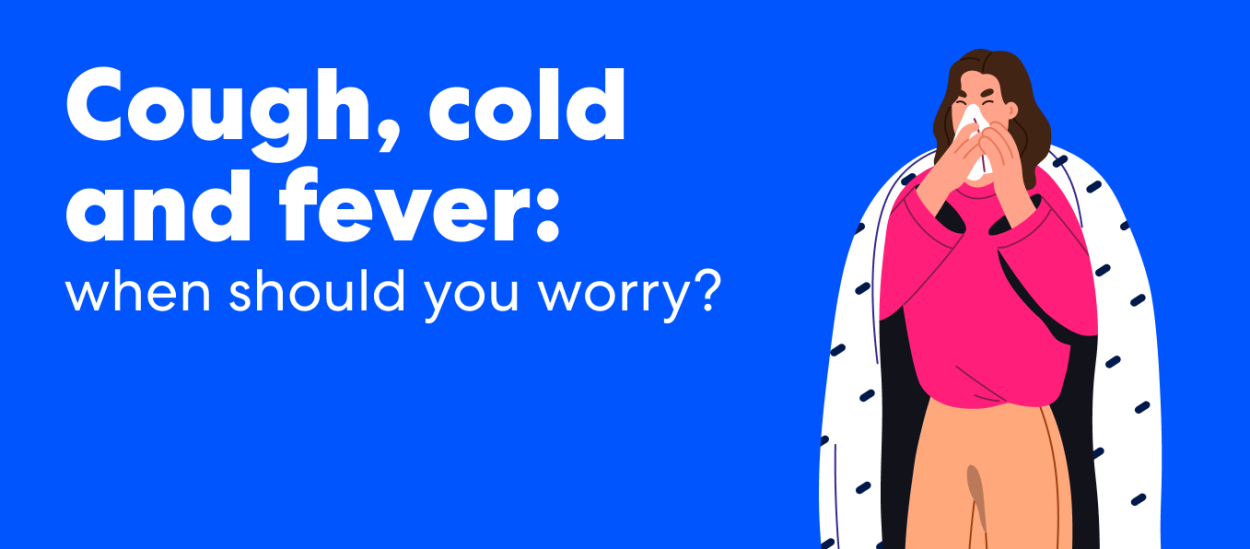Seasonal cough, cold, and fever are common across India. Most cases are mild and go away on their own. However, sometimes symptoms linger, worsen, or exhibit warning signs. This guide explains what’s normal, when to rest at home, and when to seek medical attention, using trusted medical sources.
Cold vs. Flu: What’s the difference?
A cold and the flu are both viral illnesses that affect the nose, throat, and lungs. But the flu tends to hit harder and faster. Cold symptoms usually build slowly and are milder. Typical cold symptoms are a runny or stuffy nose, sore throat, cough, sneezing, and low-grade fever. Flu symptoms often start suddenly and include high fever, chills, body aches, deep fatigue, and a harsh cough.
Most people get more than one cold each year. The flu happens less often, but when it does, it can knock you out for days. If your symptoms are severe from day one, think flu over cold and rest, hydrate, and monitor fever closely.
Cough: When to Be Concerned
A simple cold, allergies, or other minor issues can cause a cough. It often goes away within 1-3 weeks. But some patterns mean you should get checked sooner.
See a doctor if your cough:
- Lasts more than 3 weeks
- Gets worse instead of improving
- Produces green/yellow mucus for many days
- Is paired with shortness of breath or wheezing
- Comes with chest pain, fainting, or weight loss
If you smoke, have asthma/COPD, or are exposed to dust and chemicals, your risk of complications is higher. Don’t wait too long to get a medical review.

Cold Symptoms: When It’s More Than Just a Cold
Most colds are mild and last 7-10 days. They often start with a sore throat and runny nose, followed by sneezing and a cough.
Call a doctor if you notice:
- Symptoms lasting beyond 10 days
- Fever above 101.3°F (38.5°C) for more than 3 days
- Severe ear pain or fluid coming from the ear
- Facial pressure or tooth pain with coloured nasal discharge
- Breathing trouble or wheezing
For children:
- Any fever in a baby under 3 months needs immediate medical attention
- In older kids, watch for high fever, refusal to eat/drink, or unusual drowsiness

Fever – Normal vs. Worrying
A mild fever can help your body fight infection. But a very high or persistent fever should not be ignored.
Seek urgent care if:
- Fever is 103°F (39.4°C) or higher in adults
- Fever is any level in babies under 3 months
- Fever lasts more than 3–4 days
- Fever comes with rash, stiff neck, confusion, chest pain, or severe headache
Possible Complications
While most coughs, colds, and fevers are harmless, they can sometimes lead to:
- Ear infections (more common in children)
- Sinus infections with severe facial pain
- Bronchitis or pneumonia
- Asthma flare-ups
Get checked if symptoms suddenly worsen after initial improvement.

Prevention Tips
Lower your chances of getting or spreading these illnesses:
- Wash your hands often with soap and water
- Cover coughs and sneezes with a tissue or your elbow
- Avoid sharing utensils and cups when sick
- Clean frequently touched surfaces
- Eat well, exercise, and get enough sleep
Quick Checklist: When to See a Doctor
- Symptoms last longer than 10 days
- Fever is very high or lasts more than 3–4 days
- The cough lasts more than 3 weeks
- You have trouble breathing, chest pain, or confusion
- A child has a persistent high fever or refuses to drink fluids
Bottom Line
Most cases of cough, cold, and fever can be handled at home with rest, fluids, and basic care. But don’t ignore symptoms that are severe, persistent, or unusual. Seeking medical advice early can help prevent complications and expedite recovery.
If you’re looking for reliable medical support and quick access to doctors, Even Hospital makes it easy to get expert guidance anytime. From 24/7 teleconsultations to cashless hospitalisation, our team ensures you get the right care when you need it most.


